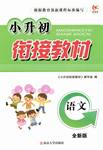题目内容
_____________home, he called up Lester.
A. In arriving B. On arriving
C. For arriving D. To arriving
练习册系列答案
 学而优衔接教材南京大学出版社系列答案
学而优衔接教材南京大学出版社系列答案 小学课堂作业系列答案
小学课堂作业系列答案 金博士一点全通系列答案
金博士一点全通系列答案
相关题目
题目内容
_____________home, he called up Lester.
A. In arriving B. On arriving
C. For arriving D. To arriving
 学而优衔接教材南京大学出版社系列答案
学而优衔接教材南京大学出版社系列答案 小学课堂作业系列答案
小学课堂作业系列答案 金博士一点全通系列答案
金博士一点全通系列答案